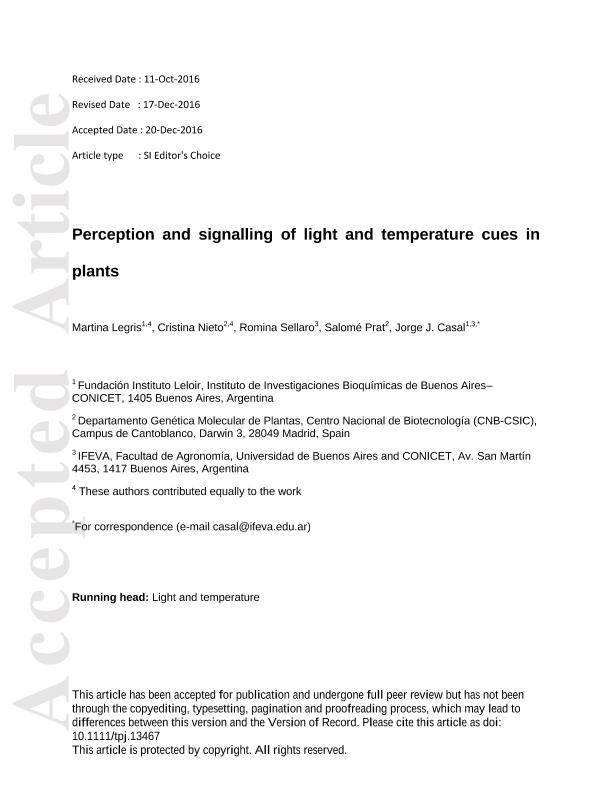Mostrar el registro sencillo del ítem
dc.contributor.author
Legris, Martina

dc.contributor.author
Nieto, Cristina
dc.contributor.author
Sellaro, Romina Vanesa

dc.contributor.author
Prat, Salomé
dc.contributor.author
Casal, Jorge José

dc.date.available
2018-07-04T15:42:13Z
dc.date.issued
2017-05-23
dc.identifier.citation
Legris, Martina; Nieto, Cristina; Sellaro, Romina Vanesa; Prat, Salomé; Casal, Jorge José; Perception and signalling of light and temperature cues in plants; Wiley Blackwell Publishing, Inc; Plant Journal; 90; 4; 23-5-2017; 683-697
dc.identifier.issn
0960-7412
dc.identifier.uri
http://hdl.handle.net/11336/51174
dc.description.abstract
Light and temperature patterns are often correlated under natural plant growth conditions. In this review, we analyse the perception and signalling mechanisms shared by both these environmental cues and discuss the functional implications of their convergence to control plant growth. The first point of integration is the phytochrome B (phyB) receptor, which senses light and temperature. Downstream of phyB, the signalling core comprises two branches, one involving PHYTOCHROME INTERACTING FACTOR 4 (PIF4) and the other CONSTITUTIVE PHOTOMORPHOGENIC 1 (COP1) and ELONGATED HYPOCOTYL 5 (HY5). The dynamics of accumulation and/or localization of each of these core signalling components depend on light and temperature conditions. These pathways are connected through COP1, which enhances the activity of PIF4. The circadian clock modulates this circuit, since EARLY FLOWERING 3 (ELF3), an essential component of the evening complex (EC), represses expression of the PIF4 gene and PIF4 transcriptional activity. Phytochromes are probably not the only entry point of temperature into this network, but other sensors remain to be established. The sharing of mechanisms of action for two distinct environmental cues is to some extent unexpected, as it renders these responses mutually dependent. There are nonetheless many ecological contexts in which such a mutual influence could be beneficial.
dc.format
application/pdf
dc.language.iso
eng
dc.publisher
Wiley Blackwell Publishing, Inc

dc.rights
info:eu-repo/semantics/openAccess
dc.rights.uri
https://creativecommons.org/licenses/by-nc-nd/2.5/ar/
dc.subject
Constitutive Photomorphogenic 1
dc.subject
De-Etiolated1
dc.subject
Early Flowering 3
dc.subject
Elongated Hypocotyl 5
dc.subject
Phytochrome B
dc.subject
Phytochrome Interacting Factor 4
dc.subject.classification
Otras Ciencias Biológicas

dc.subject.classification
Ciencias Biológicas

dc.subject.classification
CIENCIAS NATURALES Y EXACTAS

dc.title
Perception and signalling of light and temperature cues in plants
dc.type
info:eu-repo/semantics/article
dc.type
info:ar-repo/semantics/artículo
dc.type
info:eu-repo/semantics/publishedVersion
dc.date.updated
2018-06-19T15:54:52Z
dc.journal.volume
90
dc.journal.number
4
dc.journal.pagination
683-697
dc.journal.pais
Reino Unido

dc.journal.ciudad
Londres
dc.description.fil
Fil: Legris, Martina. Consejo Nacional de Investigaciones Científicas y Técnicas. Oficina de Coordinación Administrativa Parque Centenario. Instituto de Investigaciones Bioquímicas de Buenos Aires. Fundación Instituto Leloir. Instituto de Investigaciones Bioquímicas de Buenos Aires; Argentina
dc.description.fil
Fil: Nieto, Cristina. Consejo Superior de Investigaciones Científicas. Centro Nacional de Biotecnología; España
dc.description.fil
Fil: Sellaro, Romina Vanesa. Consejo Nacional de Investigaciones Científicas y Técnicas. Oficina de Coordinación Administrativa Parque Centenario. Instituto de Investigaciones Fisiológicas y Ecológicas Vinculadas a la Agricultura. Universidad de Buenos Aires. Facultad de Agronomía. Instituto de Investigaciones Fisiológicas y Ecológicas Vinculadas a la Agricultura; Argentina
dc.description.fil
Fil: Prat, Salomé. Consejo Superior de Investigaciones Científicas. Centro Nacional de Biotecnología; España
dc.description.fil
Fil: Casal, Jorge José. Consejo Nacional de Investigaciones Científicas y Técnicas. Oficina de Coordinación Administrativa Parque Centenario. Instituto de Investigaciones Fisiológicas y Ecológicas Vinculadas a la Agricultura. Universidad de Buenos Aires. Facultad de Agronomía. Instituto de Investigaciones Fisiológicas y Ecológicas Vinculadas a la Agricultura; Argentina. Consejo Nacional de Investigaciones Científicas y Técnicas. Oficina de Coordinación Administrativa Parque Centenario. Instituto de Investigaciones Bioquímicas de Buenos Aires. Fundación Instituto Leloir. Instituto de Investigaciones Bioquímicas de Buenos Aires; Argentina
dc.journal.title
Plant Journal

dc.relation.alternativeid
info:eu-repo/semantics/altIdentifier/url/https://onlinelibrary.wiley.com/doi/abs/10.1111/tpj.13467
dc.relation.alternativeid
info:eu-repo/semantics/altIdentifier/doi/http://dx.doi.org/10.1111/tpj.13467
Archivos asociados
